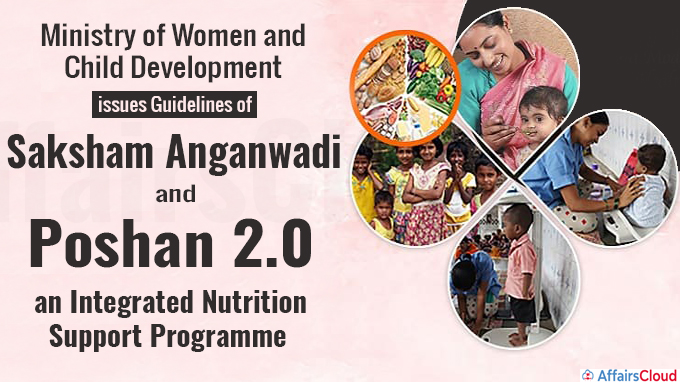
The Ministry of Women and Child Development (MoWCD) has issued Operational Guidelines for the implementation of “Saksham Anganwadi and Poshan 2.0” (POSHAN 2.0).
The Government of India (GoI) has authorized the plan for implementation during the 15th Finance Commission period, which runs from 2021–2022 to 2025–2026.
Significance
The Integrated Nutrition Support Programme Saksham Anganwadi and Poshan 2.0 aims to address the issues of malnutrition in children, adolescent girls, pregnant women, and lactating mothers through a strategic shift in nutrition content and delivery and by building a convergent eco-system to develop and encourage practices that foster health, wellness, and immunity.
POSHAN 2.0
In order to build a comprehensive strategy to address the challenge of malnutrition, the Supplementary Nutrition Programme under Anganwadi Services, the Scheme for Adolescent Girls, and Poshan Abhiyaan have been integrated under POSHAN 2.0 as an Integrated Nutrition Support Programme into the key verticals listed below:
i. Nutrition Support for POSHAN through Supplementary Nutrition Programme (SNP) for children aged 6 months to 6 years, pregnant women and lactating mothers (PWLM); and for Adolescent Girls aged 14 to 18 years in Aspirational Districts and North Eastern Region (NER);
ii.Early Childhood Care and Education (3-6 years) and early stimulation for (0-3 years);
iii. Anganwadi Infrastructure including modern, upgraded Saksham Anganwadi; and Poshan Abhiyaan
Objectives of POSHAN 2.0
- To contribute to human capital development of the country;
- Address challenges of malnutrition;
- Promote nutrition awareness and good eating habits for sustainable health and wellbeing; and
- Address nutrition related deficiencies through key strategies.
POSHAN 2.0: Area of Focus
Poshan 2.0 shall focus on Maternal Nutrition, Infant and Young Child Feeding Norms, Treatment Protocols for Severely Acute Malnourished (SAM)/ Moderately Acute Malnourished (MAM) and Wellness through AYUSH practices.
Objective: To reduce wasting and underweight prevalence, in addition to stunting and anaemia, using the ‘Poshan Tracker,’ a new, comprehensive ICT-based centralized data system linked to the Reproductive and Child Health (RCH) Portal (Anmol) of Ministry of Health and Family Welfare (MoHFW).
Key Highlights of the Guidelines
i. The Anganwadi Services Scheme is offered to all eligible beneficiaries on demand, regardless of caste, religion, or income criteria.
- The only requirement is that the beneficiary be registered at the nearest Anganwadi Centre with Aadhaar identification.
ii.The Scheme for Adolescent Girls has been revised under ‘POSHAN 2.0,’ and the targeted beneficiaries now include girls aged 14 to 18 years in aspirational districts of states such as Assam and the NER, rather than out-of-school girls aged 11-14 years previously.
- The beneficiaries will require Aadhaar numbers to avail benefits.
iii. In order to enable last-mile tracking of Take-Home Rations (THR) and tracking of pregnant women’s and lactating mothers’ migration, the guidelines further encourage Aadhaar seeding of beneficiaries under the scheme.
iv Under Poshan 2.0, AYUSH(Ayurveda, Yoga and Naturopathy, Unani, Siddha and Homeopathy)systems should be integrated for nourishment and wellness.
- To encourage beneficiaries to practice yoga and maintain their health, AYUSH will propagate the “Yoga at Home, Yoga with Family” campaigns through AWCs and households.
v.The Ministry of AYUSH will provide technical assistance for scheme implementation, recommend simple Ayurveda interventions to improve digestive capacity, populate “Poshan Vatikas” (nutrition gardens) with medicinal plants and saplings, and more.
vi.According to the guidelines, the food items for “Hot Cooked Meals” (HCM) and “THR” are specific to the states and must include healthy fruits and vegetables that are locally grown or readily available.
Recent Related News:
In June 2022, Prime Minister (PM) Narendra Modi released benefits under the ‘PM CARES For Children’ scheme via video conferencing.It aims to help children who have lost both their parents or legal guardians, adoptive parents, or surviving parents as a result of the COVID-19 pandemic between March 11th, 2020, and February 28th, 2022.
About Ministry of Women and Child Development (MoWCD):
Union Minister – Smriti Zubin Irani (Amethi Constituency, Uttar Pradesh)
Minister of State (MoS) – Dr. Munjpara Mahendrabhai Kalubhai (Surendranagar Constituency, Gujarat)




